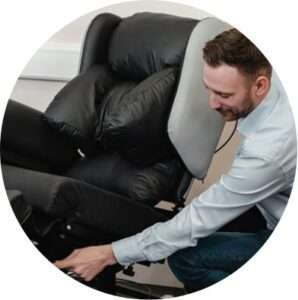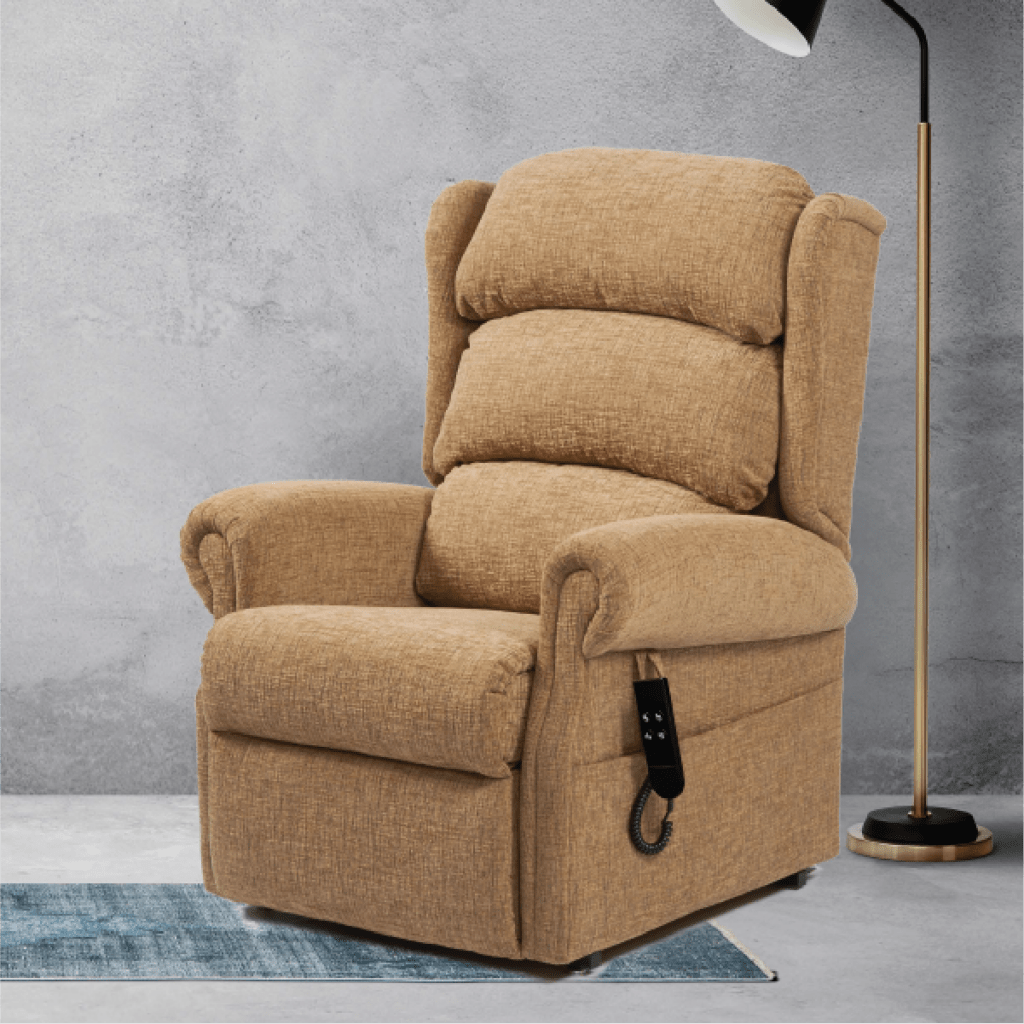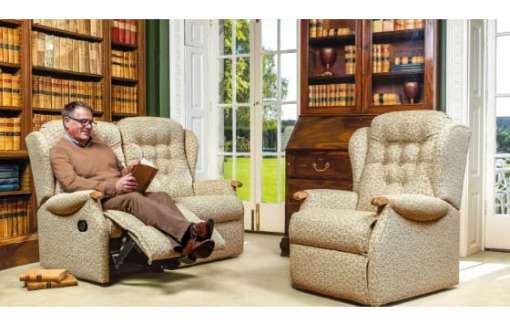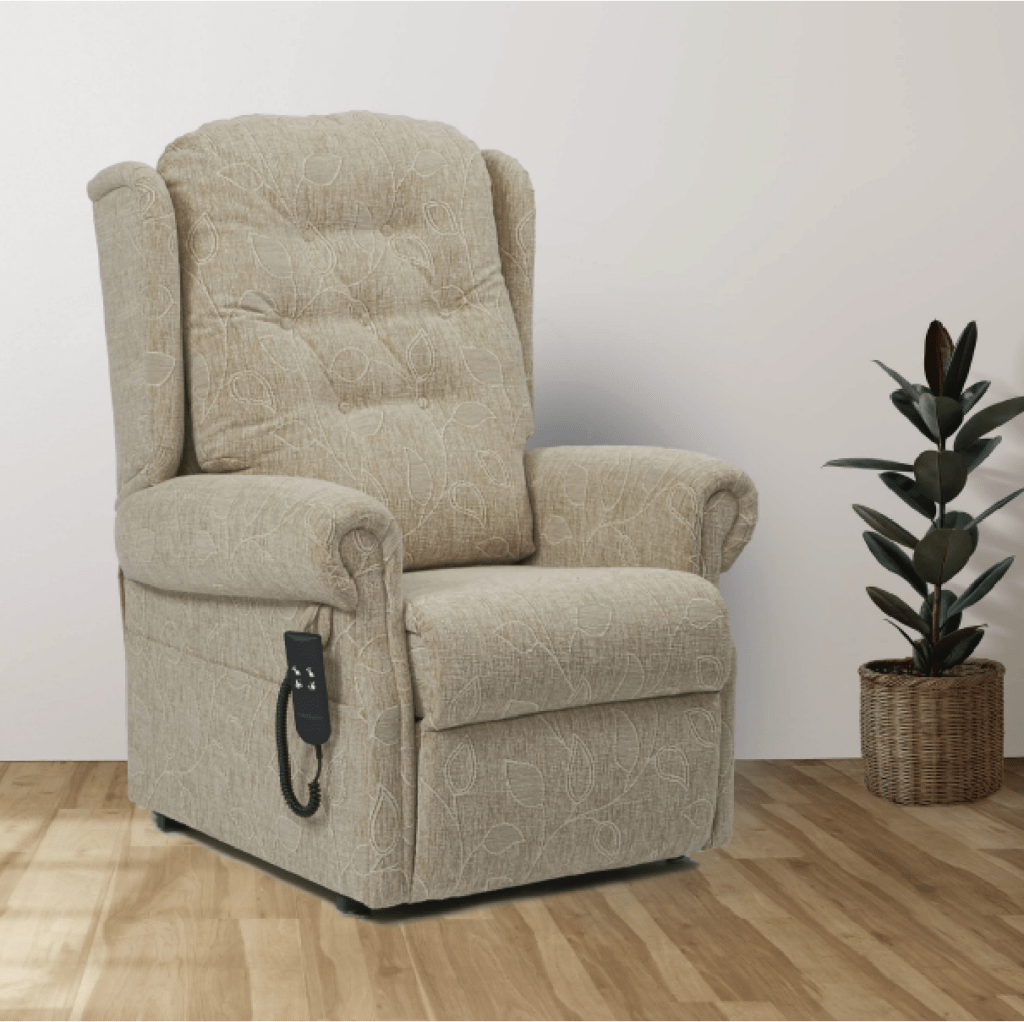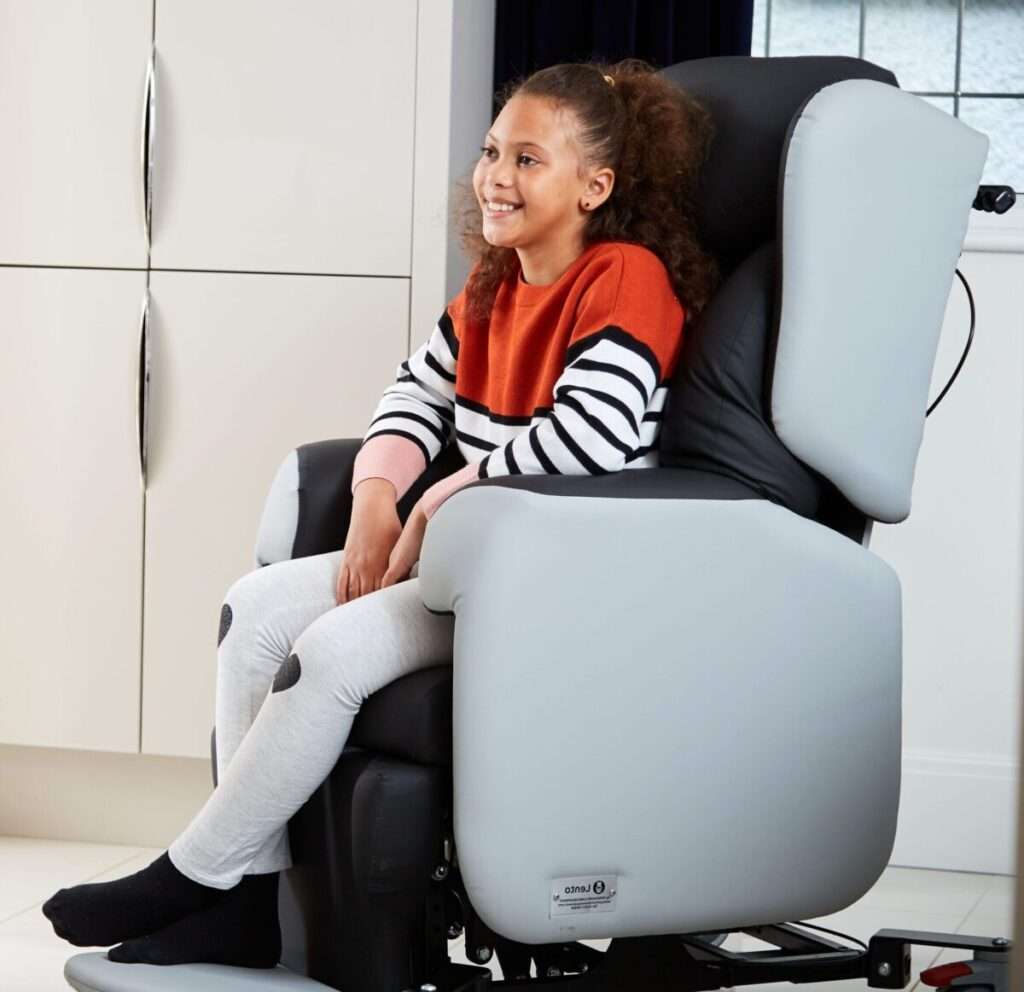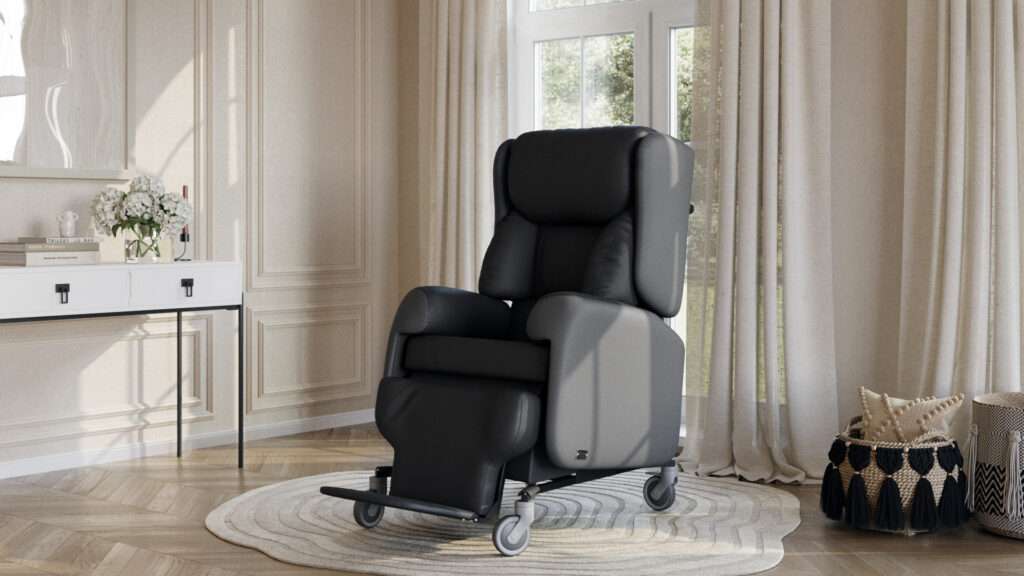Are you sitting comfortably?
As we go about our work, we often see people using the wrong chair, and witness first-hand the detrimental impact this has on their physical and mental wellbeing.
For people with mobility issues, having a comfortable chair in their home or care facility is one of the main factors in improving their occupational wellbeing. Rather than spending more time in bed due to unsuitable or poorly modified chairs, a tailored riser recliner can bring unparalleled levels of comfort, improving social mobility and wellbeing.
Jump straight to…
What is a Riser Recliner Chair?
A riser recliner chair is an armchair with movement functions that are used to reposition the chair and help the user to their feet. The primary function is the rise and recline mechanism, that helps users get out of the chair with the sit-to-stand function, as well as recline back.
They are typically used by elderly clients with reduced mobility, either in their own homes or residential care, who need assistance getting in and out of a chair and extra pressure relief.
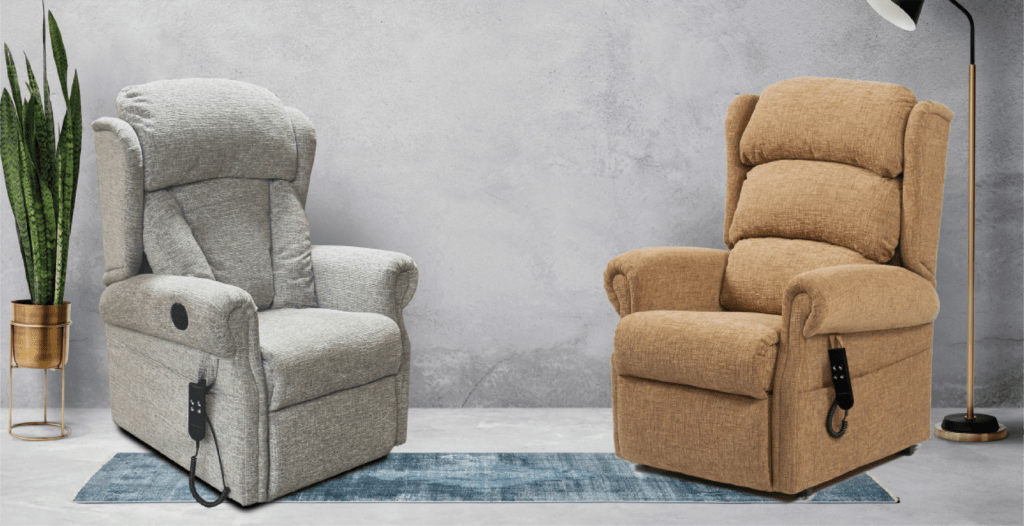
The Dales Collection Rise Recline Armchairs
It is a fairly broad seating category, covering a range of manual or motorised actions, and different tilt and rise functions.
Other terms used to describe these chairs could be recliner chairs or rise and recline chairs. They are to be distinguished from care chairs and bedside chairs. If you are not sure which chair is right for you, read our helpful guide to help you decide.
Health Benefits of Riser Recliner Chairs
Riser recliner chairs are beneficial for a wide range of users, from elderly people with balance issues and poor mobility to people with long-term health conditions like Parkinson’s or MS.
For elderly and frail users, the enhanced pressure relief and tilt-in-space positioning helps relieve symptoms of pain and joint stiffness.
People with long-term health conditions like Parkinson’s or MS find that the mechanisms in the chair compensate for their reduced mobility, and alleviate muscle stiffness and spasms that make everyday movements like getting out of a chair harder.
For people with musculoskeletal problems that affect their posture, riser recliners can promote better pelvic alignment and postural support.
They also support rehabilitation for patients in hospital or recovering in the community after discharge. Our Lento Mobile chair is a great example of an assistive chair for hospital rehabilitation.
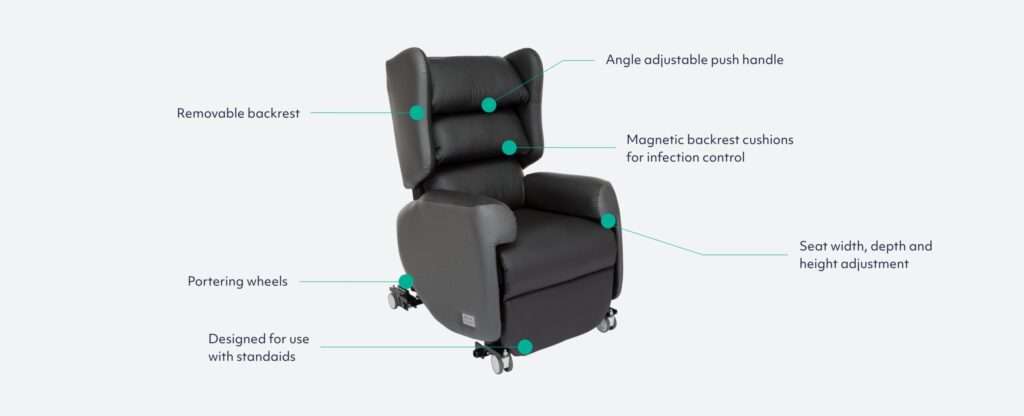
We designed the Lento with features to help provide better postural positioning, and lateral support can aid healthy spinal alignment.
Riser recliners provide comfort, support, and ease of mobility, enhancing quality of life for all users.
Points to Consider When Choosing a Riser Recliner Chair
If you are looking for a riser recliner chair, what are the main points you need to look out for, you may be asking?
In this guide we cover the key features you need to look out for when looking for a riser recliner chair for yourself, a client or loved one.
Seating Goals
First and foremost, it’s important to think about why you are buying a riser recliner and the seating goals you are trying to achieve.
If you are wanting to sit alongside your friend or partner, you may want to consider our rise recline sofas which have independent movement on each side.
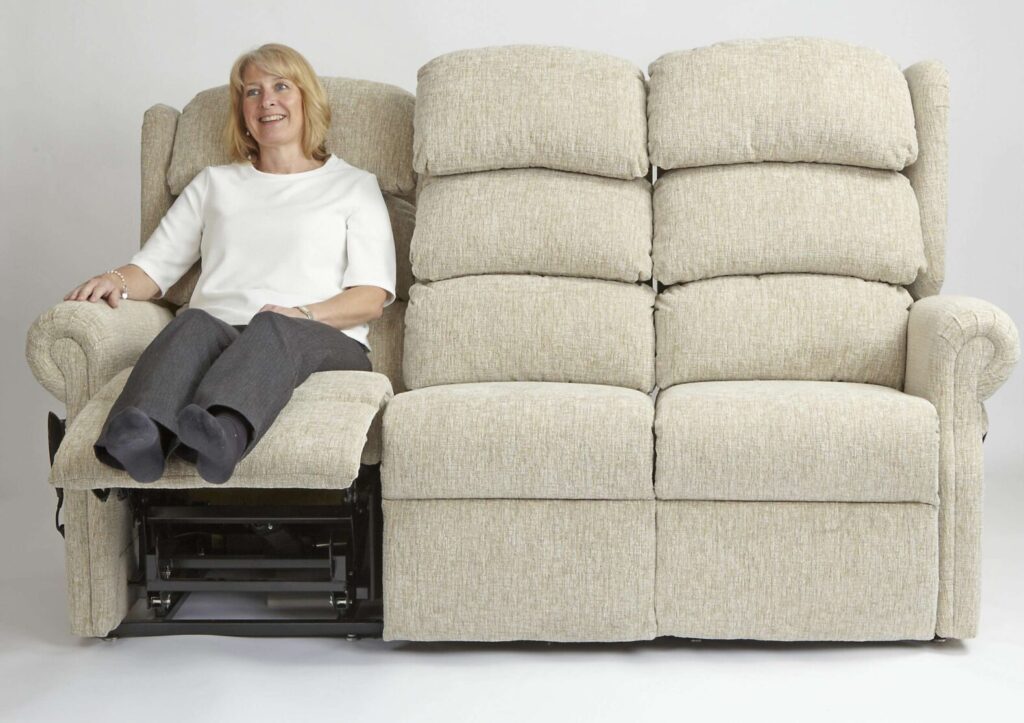
Rise Recline Sofa
Also, think about what the person’s daily hobbies and activities are. Riser recliners can support daily activities such as sewing, reading, writing, meals and sleeping, and can be used with a tray or overchair table.
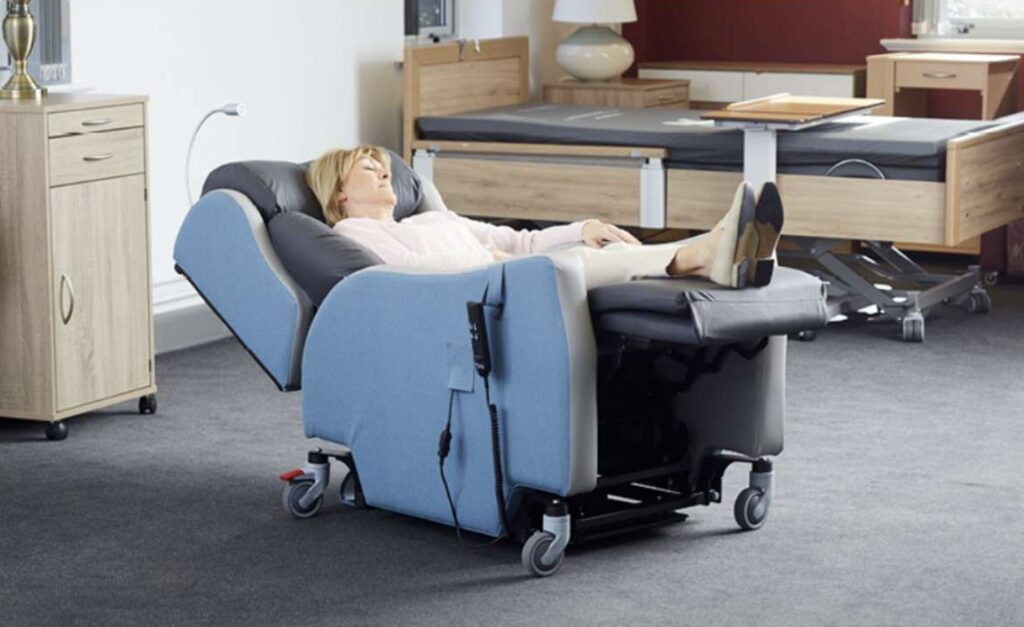
Size
Seat sizing is a key determinant of good posture and pressure care, so it’s crucial to get this right.
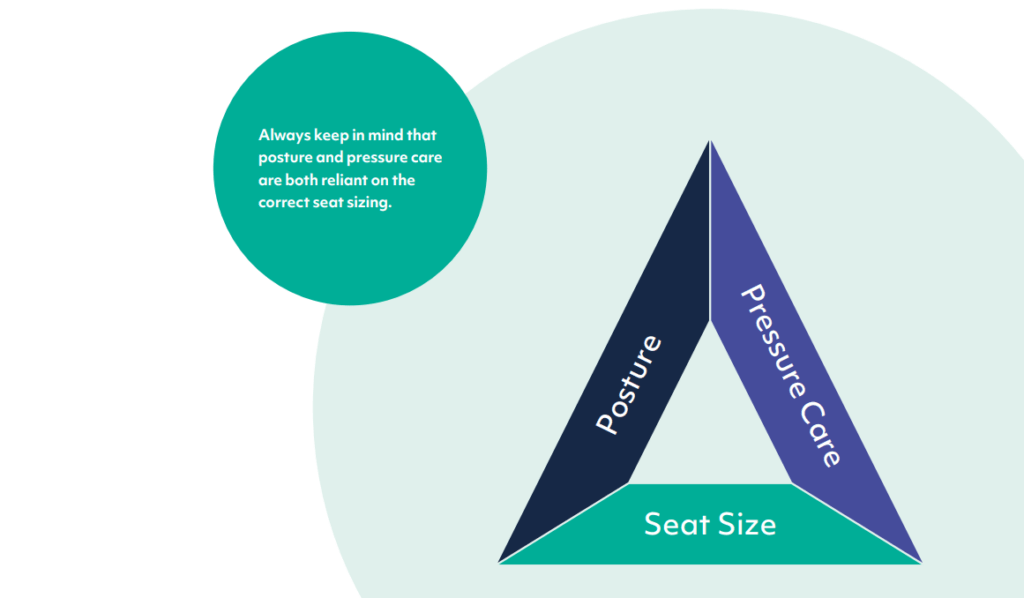
Our guide to seating measurement provides all the hints and tips you need to know to get accurate seat measurements. This guide explains how to get accurate seat height, depth, width, armrest height and back height measurements, to ensure the chair dimensions are right for the individual user.
Download Our Seat Sizing Guide
Motor Action
The choice of motor action in a riser recliner affects the positioning options on the chair and will vary according to the user’s overall mobility and postural needs.
Single Motor Tilt In Space – usually with a two-button handset, single motor action tilts the user back in the chair into a zero-gravity position, and helps the user to their feet with the rise mechanism.

Single motor tilt in space action
Dual Motor – this doesn’t provide tilt-in-space, as the footrest and backrest move independently while the seat angle stays the same. It allows for lie-flat positioning, but is not an action we usually recommend as it doesn’t have the health benefits of tilt-in-space.

Dual motor recline
Dual Motor Tilt In Space – works in the same way as single tilt-in-space, with the addition of independent movement in the backrest and legrest section, giving more positioning options and lie-flat functionality.

Dual motor tilt in space action
For more information, read our previous article on the key differences between single and dual motor action.
Backrest
The choice of backrest makes a big difference to overall levels of comfort, and promoting good posture.
Waterfall back
Ideal for people with scoliosis or osteoporosis, as the soft 3-tiered cushions shapes round the user’s back profile.
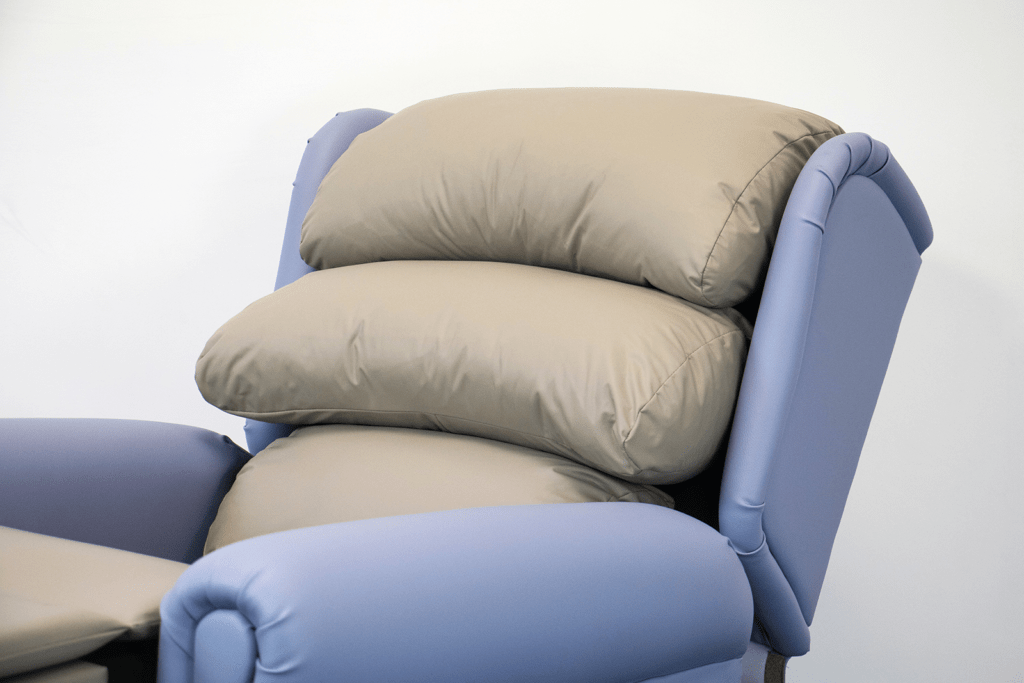
Comfort chair with waterfall backrest
Waterfall lateral back
With the addition of lateral supports built into one of the cushions, this backrest can be configured to provide the best lateral (sideways) support for users who tend to lean to one side.
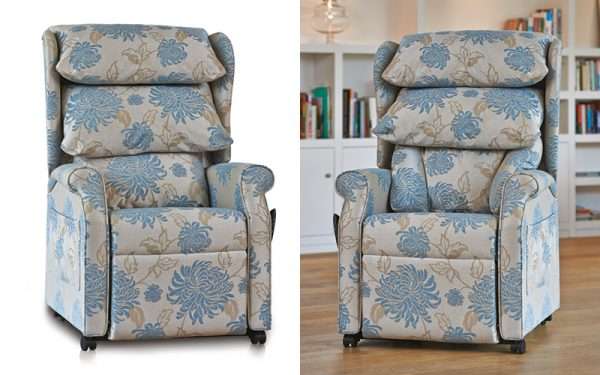
Copgrove chair with waterfall backrest (left) and waterfall lateral backrest (right).
Firm back
More like you would see on a fireside chair, this backrest has a flatter profile and firmer cushioning which helps maintain good posture.
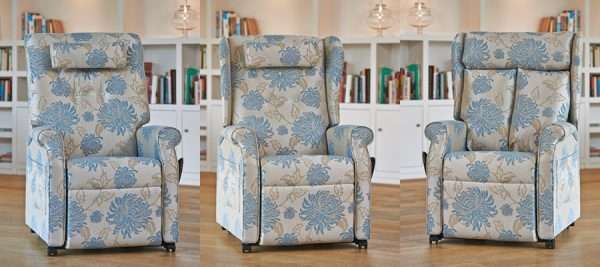
L-R: Copgrove with soft flat back, firm flat back, and the T back.
Soft flat back
With softer foam, these backrests maintain their shape better than waterfall backs, and provide good lumbar support.
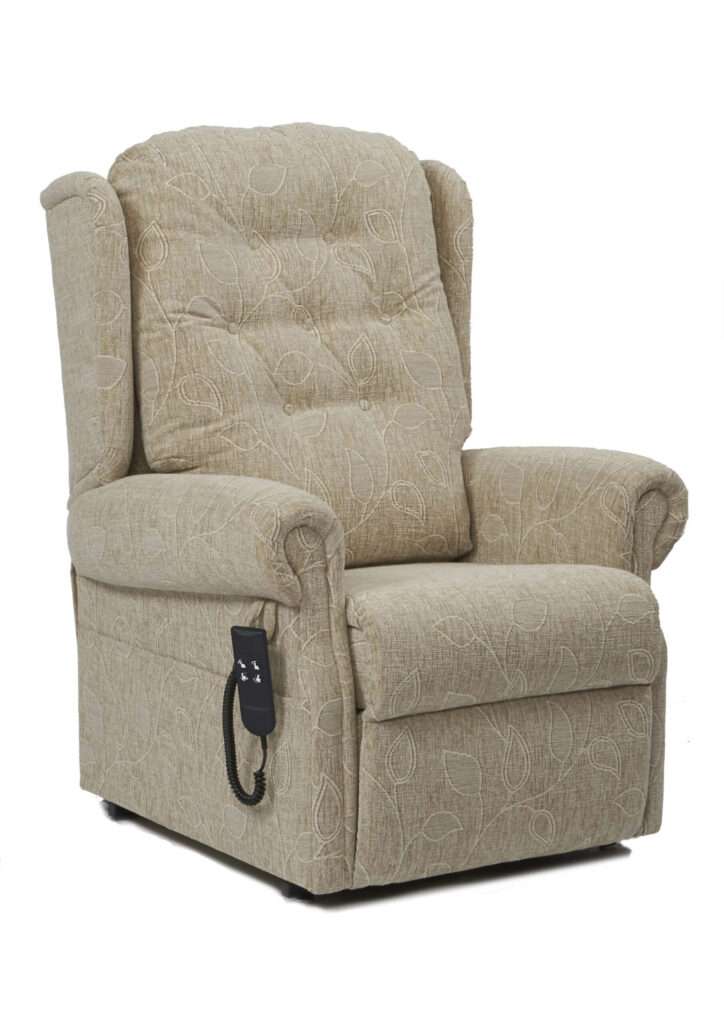
Wharfedale Rise Recline Armchair – Soft Backrest
Lateral back
Also known as cocoon backrests, these have lateral support all the way up each side of the backrest, which is great for helping users with trunk instability maintain a good midline position.
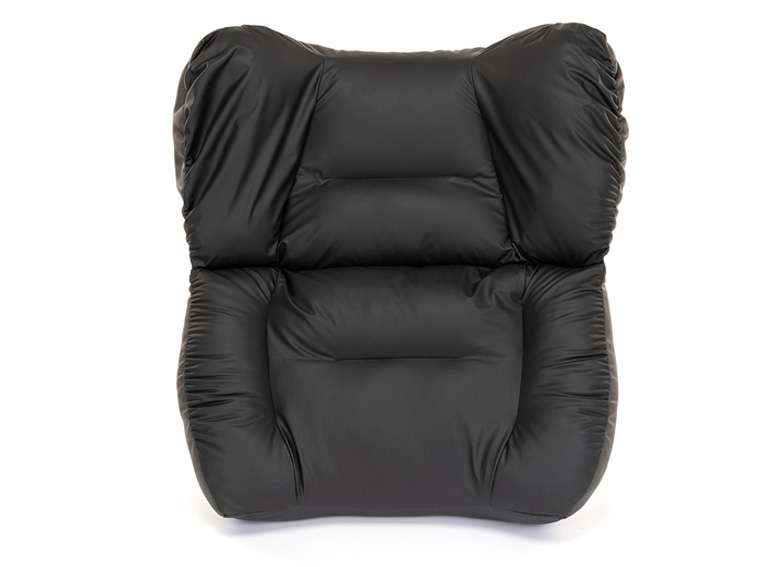
Cocoon backrest
T back
T-backs are a great solution for people with a kyphosis (hunched back). They are made up of three separate cushions, two vertical ones from seat to shoulder level, and a horizontal cushion at the head level.
Pressure relief
Firstly, the tilt-in-space function greatly improves pressure relief for riser recliner users (as well as many other benefits), by redistributing the person’s weight more evenly across their body when they are tilted back in the chair.
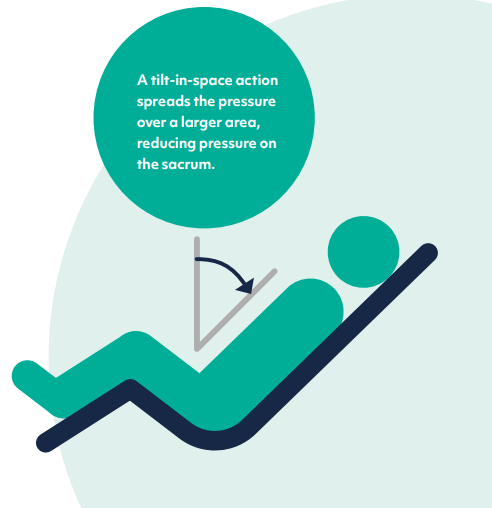
Tilt-in-space functionality
To provide further pressure relief for users who may be at higher risk of pressure sores because of poor skin integrity, additional pressure relief features can be built into riser recliner chairs such as:
Medium to low pressure relief
For medium to low pressure relief, our assessors usually prescribe a 2” visco seat wrap, providing extra comfort.
Medium to high pressure relief
For situations where the pressure risk is medium to high, gel-based pressure relief is used for the top 2” of the seat and legrest, which are the areas of the body most likely to develop pressure injuries if left untreated.
Drop-in Seat
Some riser recliners have a design that allows for a full depth pressure-relieving seat cushion (such as a gel or an alternating dynamic air cushion) to be placed in the seat cavity.
Covered Drop-in Seat
Similar to the drop-in seat but integrated into the seat base and hidden from view, the Covered Drop-in has a Vapour Permeable or Panvelle Stretch layer that covers the cushion.
Armrests
Armrests can have a contemporary look such as cutaway armrests, or a more traditional appearance like scroll arms. Wooden knuckles help more frail users stand out of the chair as they provide a firmer grip than fabric or leather.
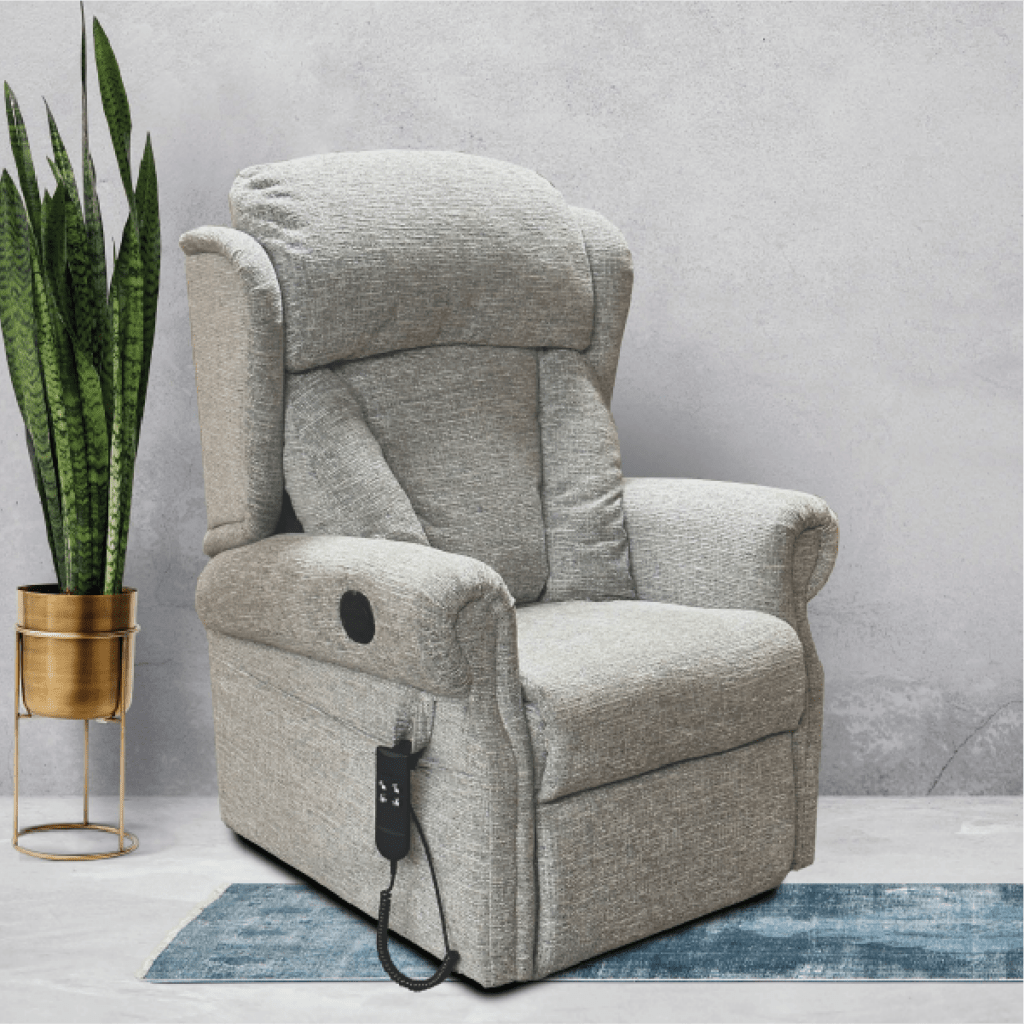
Nidderdale Armchair with scroll armrests
Upholstery
There are lots of different materials and fabrics to choose from, depending on your design and pressure needs. Vinyl is hard-wearing and water-resistant, but tends to be used in healthcare settings as it doesn’t have the soft or homely feel preferred in domestic environments.
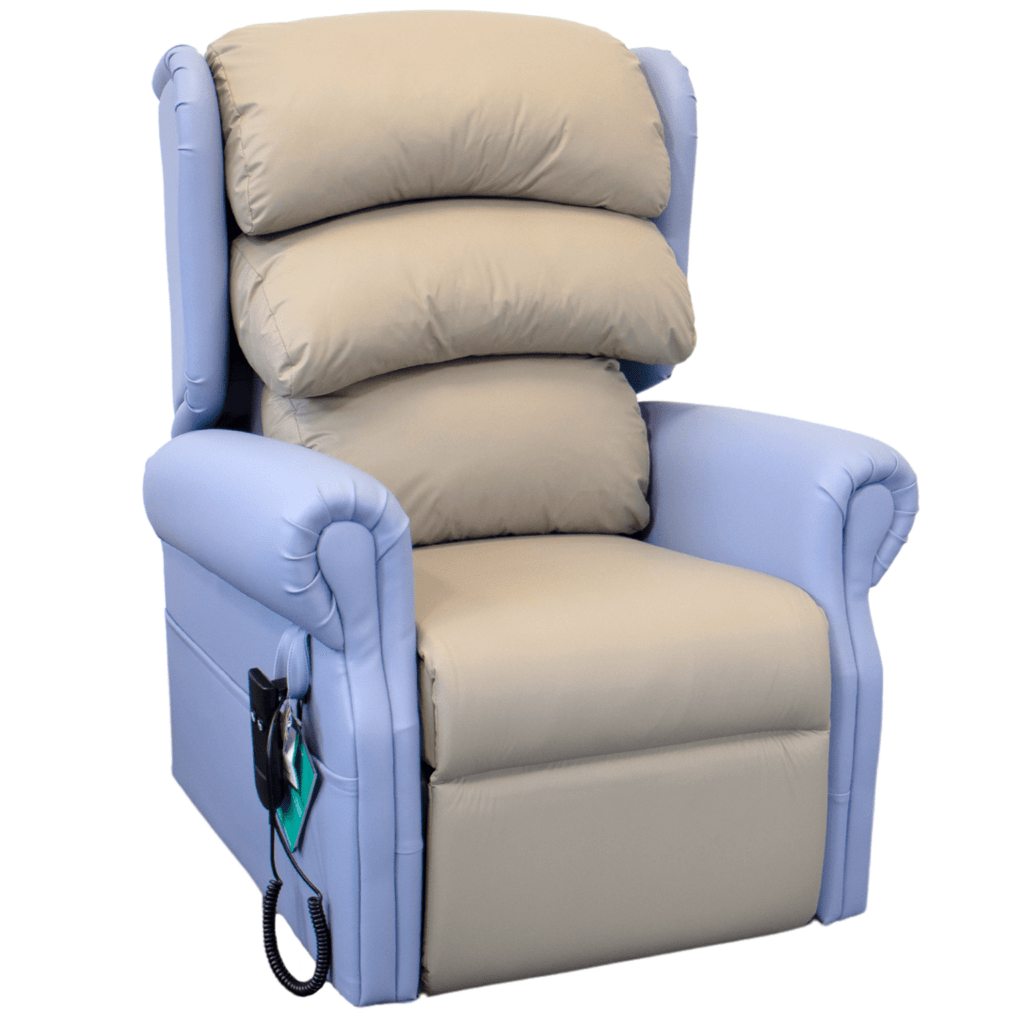
Comfort Rise and Recline chair in waterproof fabric
Vapour-permeable fabrics like dartex are a great option for users who need a surface fabric that can be easily wiped clean and provide good pressure relief. The breathable qualities of dartex keep the skin cool and hydrated, suitable for longer periods of sitting.
Contemporary woven fabrics and faux leathers are also available in a wide range of different colours and styles, to suit interior décor.

Dales Collection Fabric and Size Options
Conclusion
Before finalising your purchase decision, take the opportunity to get out to seating showrooms and try the chairs out. Or even better, request a free home assessment where you can try the chairs out in the comfort of your own home!
It’s also worth asking about fire and safety certifications, and how to adjust the chair to tailor to your individual requirements.
Book a visit to our product showroom to try out our full seating range!
Book a Showroom Visit
FAQs
- What is a riser recliner chair? A riser recliner chair is an armchair designed to assist users in getting in and out of the chair with its rise and recline functions. These chairs are particularly helpful for individuals with reduced mobility, providing comfort and support.
- Who can benefit from a riser recliner chair? Riser recliner chairs are ideal for: Elderly individuals with mobility or balance issues; people with long-term health conditions like Parkinson’s, MS, or musculoskeletal problems, and individuals in rehabilitation or recovering from surgery.
- What should I consider when choosing a riser recliner chair? Seating goals: Determine how the chair will be used and what daily activities it should support. Size: Ensure the chair’s dimensions are suitable for the user’s height, width, and posture needs. Motor action: Choose between single or dual motor options, considering tilt-in-space or lie-flat functionality. Backrest type: Select the backrest design based on the user’s comfort and spine health needs. Pressure relief: Assess whether the user requires additional pressure-relieving features. Armrests and upholstery: Choose styles and materials suited to the user’s preferences and care requirements.
- What is the difference between single and dual motor riser recliners? Single Motor Tilt In Space: Offers a zero-gravity position with simple two-button control, beneficial for pressure relief and posture. Dual Motor: Allows independent movement of the footrest and backrest, providing more flexibility but lacking tilt-in-space benefits. Dual Motor Tilt In Space: Combines the benefits of single motor tilt-in-space with independent movement for advanced positioning.
- How can riser recliner chairs improve health? These chairs support better posture, enhance pressure relief, and ease mobility. They are particularly beneficial for relieving joint pain, muscle stiffness, and improving pelvic alignment.
- Can I try a riser recliner chair before buying? Yes! Visit a showroom or request a free home assessment to test chairs in person. This ensures you select a chair tailored to your specific needs and environment.
- Do riser recliner chairs meet safety standards? Ensure the chair you choose has fire safety certifications and inquire about adjustments to customize the chair for your needs.



